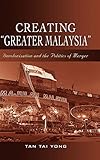Creating "Greater Malaysia" : Decolonization and the Politics of Merger / Tan Tai Yong.
Material type: TextPublisher: Singapore : ISEAS Publishing, [2008]Copyright date: ©2008Description: 1 online resource (252 p.)Content type:
TextPublisher: Singapore : ISEAS Publishing, [2008]Copyright date: ©2008Description: 1 online resource (252 p.)Content type: - 9789812307477
- 9789812307989
- 959.5051 23
- DS526.7
- online - DeGruyter
| Item type | Current library | Call number | URL | Status | Notes | Barcode | |
|---|---|---|---|---|---|---|---|
 eBook
eBook
|
Biblioteca "Angelicum" Pont. Univ. S.Tommaso d'Aquino Nuvola online | online - DeGruyter (Browse shelf(Opens below)) | Online access | Not for loan (Accesso limitato) | Accesso per gli utenti autorizzati / Access for authorized users | (dgr)9789812307989 |
Frontmatter -- Contents -- Preface -- Map of British Colonies in Southeast Asia (1946) -- Map of Malaysia (1963) -- Introduction -- CHAPTER ONE: Decolonization and the “Grand Design”: Aspects of British Policy in Post-War Southeast Asia -- CHAPTER TWO: Merger and Greater Malaysia: Political Attitudes towards Union between Singapore and the Federation -- CHAPTER THREE: Setting the Stage: Tunku’s Ulster-type Merger and Singapore’s White Paper Proposals -- CHAPTER FOUR: The Citizenship Issue -- CHAPTER FIVE: Financial Arrangements and the Common Market -- CHAPTER SIX: The Borneo Territories and Brunei -- Conclusion -- Bibliography -- Chronology of Key Events Leading to the Formation of Malaysia -- Dramatis Personae -- Index -- About the Author
restricted access online access with authorization star
http://purl.org/coar/access_right/c_16ec
This book offers an in-depth and detailed analysis of the political processes that led to formation of the Federation of Malaysia in 1963. It argues that the Malaysia that came into being following the amalgamation of Malaya, Singapore, Sarawak and North Borneo was a political creation whose only rationale was that it served a convergence of political and economic expediency for the departing colonial power, the Malayan leadership and the ruling party of self-governing Singapore. "Greater Malaysia" was thus an artificial political entity, the outcome of a concatenation of interests and motives of a number of political actors in London and Southeast Asia from the 1950s to the early 1960s. The book contrasts the complicated negotiations and hard bargaining between Singapore and Malaya on the critical issues of citizenship, control of finances and the development of a common market during the lead-up to merger with the relative ease with which the North Borneo Territories were incorporated in the Federation. The haste and testing conditions in which negotiations were conducted between 1961 and 1963, often with the British facilitating the process as an "honest broker", led to a number of unresolved compromises between Singapore and Kuala Lumpur. These compromises, however, did not obviate the possibility of future difficulties, and the seeds of dissension sown by the disagreements between the two governments were to sprout into major crises during Singapore's brief history in the Federation of Malaysia.
Mode of access: Internet via World Wide Web.
In English.
Description based on online resource; title from PDF title page (publisher's Web site, viewed 01. Dez 2022)


